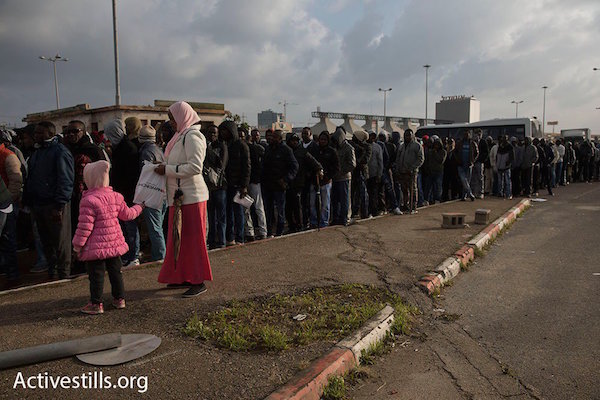An appeals tribunal recognizes an Eritrean man’s refugee status on the grounds that he fled the Eritrean army, rejecting a policy that has resulted in one of the lowest refugee recognition rates in the world. Attorney Elad Cahana, who worked on the case, speaks to +972 Magazine about its implications for the thousands of asylum seekers Israel is planning to deport.

A Justice Ministry appeals tribunal last week handed down what many are hoping will be a groundbreaking ruling for Eritrean asylum seekers in Israel. A judge ruled that desertion from the Eritrean army, which forms at least part of the basis of a great number of Eritrean nationals’ asylum applications, is a valid basis for refugee status. Up until now, the Interior Ministry has refused to recognize desertion as a basis for refugee status in asylum claims.
Under the ministry’s existing policy, Israel has rejected thousands of Eritrean asylum seekers’ requests for refugee status. According to the Migration Policy Institute, 91.4 percent of Eritreans are recognized as refugees in Europe. Israel, in comparison, has granted refugee status to just 11 Eritreans — including the man whose application was validated in court last week.
In Eritrea, ruled by dictator Isaias Afwerki, adult men face indefinite conscription and slavery-like conditions in the army. Fleeing indefinite military service is the basis for the high refugee recognition rates of Eritreans around the world.
So will this possibly precedent-setting ruling spell hope for the thousands of Eritreans in Israel with asylum claims pending, and perhaps even for the thousands whose claims have already been rejected? As Israel prepares to deport tens of thousands of African asylum seekers, these questions are more urgent than ever.
To find out, +972 Magazine spoke with Attorney Elad Cahana of Tel Aviv University’s Refugee Rights Clinic who, along with Atty. Anat Ben Dor, represented the Eritrean man at the center of last week’s case. Cahana, speaking by phone on Monday, stressed that while the decision is an important change, it is too early to say what the precise implications will be.
You had a case recently in which a Justice Ministry appeals tribunal ruled that, contrary to Interior Ministry policy up until now, desertion from the Eritrean army can be part of a valid asylum claim. What does that decision mean for other Eritrean asylum seekers in Israel?
It should lead to a re-examination of all of the cases that have been rejected.
I assume that the Ministry of Interior will do all it can to overrule this judgement or to narrow it down as much as possible.
What is your hope or expectation about how this decision will affect pending asylum claims of Eritreans? How about previously rejected claims? Can they be reviewed now?
I think yes, but again, it’s not very clear.
First of all, they [the Interior Ministry] can appeal. They can maybe win and overrule it.
Second of all, it’s a question of how they will interpret it. From my experience, the Ministry of Interior interprets every decision given against them always as individual and specific with no general implications, and every decision in their favour as generalizable.
Why did it take so long for a decision like this to come down? Is the legal process just that slow for refugee claims in Israel? Do you think the impending deportations influenced the judge?
I don’t know why, I can only assume. To be accurate, the tribunal already made this ruling in September 2016, which was overruled by a district court, which was sent back to the tribunal, which reconfirmed its decision.
And I don’t know [if impending deportations influenced the judge].
Can we expect a broader legal challenge to the deportation plan? Can you explain why offering someone a choice between prison and deportation is problematic legally?
I don’t know what we’re going to do yet, so I can’t elaborate.
I think it’s problematic because, first of all, I think these people are asylum seekers. Those who didn’t manage to file requests didn’t because of the failures of the Israeli asylum system, and those who did were rejected unlawfully.
Second of all, according to international law, you cannot deport asylum seekers as long as their applications are pending.
Thirdly, this whole scheme with an unknown third country — a country that denies the existence of any agreement — is very unprecedented in the world. It’s very exceptional on the international landscape.
The information from Rwanda is very, very worrying. The court recognised these problems, but approved the plan anyway. But what we read in the press should worry the government.
Anything else you think people should know about this decision?
It’s too soon to know what it’s effect will be. We’ll have to wait to see how the Immigration Authority implements the decision.
But this decision shows how the authorities have failed in the asylum process in general for years. These are people who are recognised as refugees in large percentages all around the world, but who in Israel, something like 0.3 percent are recognised.
We have claimed for years that [Israel’s asylum process] is flawed and unlawful, and this decision by the tribunal has given us proof.

